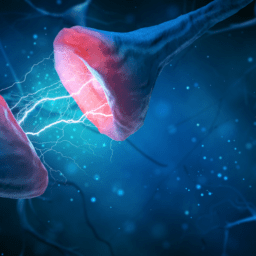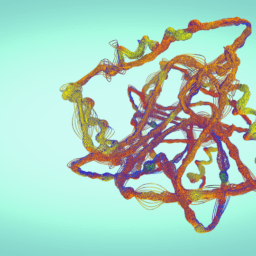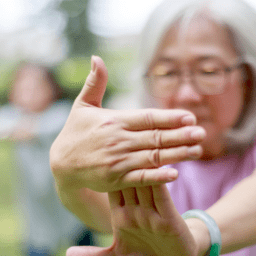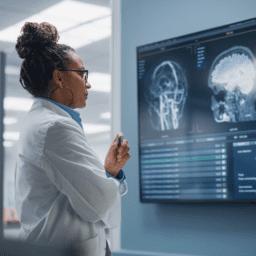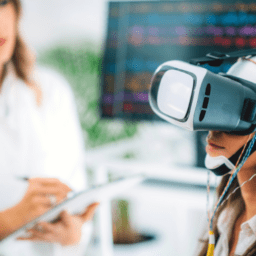AI, blood tests, and early diagnoses. Genetic ancestry and Parkinson’s prevalence. Sleep surveys, therapies, and research. Cannabis contaminants. Updates from numerous ongoing trials.
Read on for the latest in Parkinson’s research, therapies, and living well stories!
SCIENCE AND RESEARCH NEWS
PARKINSON’S PATHOLOGY AND PATHOGENESIS
- Using artificial intelligence, researchers at the University College London and University Medical Center Goettingen have developed a blood test that may be able to detect Parkinson’s up to seven years before symptoms emerge. The study, published in Nature Communications, explains how experts used machine learning to accurately diagnose 16 people who later developed Parkinson’s.
- Published in Nature Neuroscience, the first-ever study to explore specifically how African ancestry influences gene function in the human brain found evidence that genetic ancestry is responsible for the increased prevalence of certain neurological disorders (such as Alzheimer’s and stroke) and decreased prevalence of others (including Parkinson’s) in Black Americans.
- In npj Parkinson’s Disease, researchers highlight six newly discovered genetic variants associated with mortality and motor progression in people with Parkinson’s. These newly discovered variants are largely different from the genetic factors that increase the risk of Parkinson’s, the paper explains.
- Another study published in npj Parkinson’s Disease explores potential roles the cerebellum may play in the pathophysiology of Parkinson’s. The researchers investigated whether structural and functional alterations of the cerebellum correlate with motor and non-motor symptoms in people with early-stage Parkinson’s.
- Also in npj Parkinson’s Disease, a study by researchers at Nagoya University Graduate School of Medicine found less bacteria that synthesizes essential B vitamins in the intestinal tracts of people with Parkinson’s. The researchers believe this may weaken intestinal barriers and cause inflammation in the brain, and that supplementation with B vitamins may have a role in treating Parkinson’s.
- Researchers at the National Institutes for Quantum Science and Technology in Japan have developed novel imaging technology that can visualize how alpha-synuclein aggregates accumulate in the brains of people living with Parkinson’s and Lewy Body Dementia.
- In what its authors believe is the largest genetic analysis of familial Parkinson’s to have been undertaken, a paper published in Nature Genetics identifies RAB32 as a susceptibility gene for familial Parkinson’s.
- Results from a study by researchers at the University of Birmingham showed for the first time a link between a person’s brain dopamine levels and their “mentalising abilities.”
- In a paper published in Science Advances, researchers from the University of Dundee highlight a newly unveiled model that explains how the PINK1 enzyme is activated. The findings could help inform future Parkinson’s research and the development of treatments that target PINK1 at the translocase of outer membrane (TOM) complex.
- Findings from a paper published in Cell Death Discovery suggest that retrograde transport regulated by SNX1-retromer may be significantly involved in the pathogenesis of Parkinson’s and may be a potential target for future treatments.
- A study published in Nature Communications presents a new method of enhancing the folding and stability of lysosomal hydrolases. The researchers believe this new method could be used to develop new therapies that enhance lysosomal function and reduce toxic protein aggregates.
- In another paper published in Nature Communications, researchers at Johns Hopkins Medicine explain how they identified a new therapeutic target involving Aplp1, a protein that helps facilitate the spread of alpha-synuclein in the brain. In mouse models, a cancer treatment approved by the U.S. Food and Drug Administration (FDA) that targets Lag3, a protein that interacts with Aplp1, has shown the potential to block this spread, leading researchers to believe it may be an effective treatment for Parkinson’s.
- Two recent studies have uncovered previously unknown cellular mechanisms involved in alpha-synuclein aggregation and misfolding, key characteristics of Parkinson’s. The findings highlight multiple new pathways that support pathogenesis and may serve as therapeutic targets for restoring neuronal function in people with Parkinson’s and other neurodegenerative conditions.
PARKINSON’S TREATMENTS
- Results from Part B of Vaxxinity’s Phase 1 clinical trial of UB-312, an investigational vaccine for Parkinson’s, showed that UB-312 was well-tolerated and induced anti-alpha-synuclein antibody responses in participants with early-stage Parkinson’s, meeting the primary objectives of the trial. Geert Jan Groeneveld, MD, PhD, principal investigator of UB-312’s Phase 1 trial, said, “A vaccine against alpha-synuclein is a revolutionary concept that can be of immense impact in treating neurodegenerative diseases such as Parkinson’s.”
- A team of medics from the University of Dundee’s School of Medicine are optimistic following the successful results of an ultrasound thalamotomy procedure, performed for the first time in Scotland this June. The non-invasive procedure has been shown to reduce uncontrolled tremors in people with Parkinson’s.
- A study published in Nature Communications explores how deep brain stimulation (DBS) can improve certain Parkinson’s symptoms by targeting specific white matter tracts.
- Findings from another study that focused on DBS highlighted the need for detailed anxiety assessments as part of the advising and monitoring stages of subthalamic nucleus deep brain stimulation (STN-DBS).
- In other DBS news, a study published in CNS Neuroscience & Therapeutics found that the brain’s movement-related network was significantly reorganized during the microlesion period of DBS.
- Using a non-invasive brain stimulation technique called dual site transcranial magnetic simulation, researchers at Murdoch University’s Center for Healthy Aging investigated connections between brain regions that are responsible for voluntary movement control in people with Parkinson’s. The study may lead to new treatments that address Parkinson’s-related resting tremor.
- A study by researchers at Stanford Medicine explores why certain treatments for Parkinson’s motor symptoms improve speech impairments, while others make them worse.
- Researchers in Japan published a pilot study in the eNeurologicalSci journal that suggests that lactulose, a synthetic sugar used to soften stools, may be an effective treatment for constipation in people with Parkinson’s.
- Preclinical research published in Communications Biology suggests that a class of medications called mitochondria-targeted drugs (MTDs) may be able to increase levodopa’s efficacy on Parkinson’s symptoms by directly reversing the gut bacteria metabolism of levodopa.
- Stimvia announced that it has successfully completed its pilot study of URIS for Parkinson’s. Early preliminary data from the small study showed that URIS, a noninvasive neuromodulation device, minimized symptoms and improved quality of life for participants.
- Improved regulations and education about medical cannabis and its potential contaminants are needed to keep people with Parkinson’s safe, according to a study published in NeuroToxicology.
- A small study in China found that spinal cord stimulation safely improved postural concerns for people with Parkinson’s. The researchers expressed optimism about the results but pointed out that further studies are needed.
- Using data from a large longitudinal study of people newly diagnosed with Parkinson’s, researchers identified dissociable associations between dopaminergic medications and different symptoms of depression in Parkinson’s. Findings showed that dopamine agonists were effective in treating motivational symptoms of depression, while monoamine oxidase-B inhibitors improved both depressive and motivation-related symptoms.
- Inhibikase Therapeutics has completed enrollment in its Phase 2 trial evaluating the safety and tolerability of risvodetinib, a selective c-Abl inhibitor, for treatment in people with Parkinson’s who have not begun taking medication. The company expects to report trial results in late 2024.
- In part thanks to an additional $12.5 million in funding, Lucy Therapeutics will work to advance a new class of therapeutics designed to address mitochondrial dysfunction, with the goal of providing new treatments for Alzheimer’s, Parkinson’s, and Rett syndrome.
- At the June Advanced Therapeutics in Movement and Related Disorders Congress, BioVie shared a first look at the protocol design of its upcoming SUNRISE-PD Phase 2 trial of bezisterim (NE3107) in people with early Parkinson’s, along with an encore presentation of detailed results from the company’s Phase 2a trial of bezisterim adjunctive to carbidopa/levodopa (C/L) in people with Parkinson’s.
- In a Complete Response Letter (CRL) to AbbVie, the FDA cited observations that were identified during inspection of a third-party manufacturer listed in the New Drug Application (NDA) for ABBV-951, a combination of foscarbidopa and foslevodopa designed to treat motor fluctuations in people with advanced Parkinson’s. The CRL did not identify any issues related to the safety, efficacy or labeling of ABBV-951 and did not request that AbbVie conduct additional efficacy and safety trials related to the therapy.
- In June, the Michael J. Fox Foundation for Parkinson’s Research (MJFF) announced that a total of $9.75 million will be distributed to five research teams who are developing “quantitative” biomarker tools to biologically measure and track the progression of Parkinson’s from its earliest detection through more advanced stages.
OTHER NEWS
- Researchers in Iran published a paper in Health Science Reports that highlights associations between depression, cognitive decline, and low sex drive in people with Parkinson’s.
- A CNN feature takes a deep dive into the first diagnosis of Rapid Eye Movement Sleep Behavior Disorder (RBD) and its connections to Parkinson’s.
- The New York Times Magazine published an in-depth story about Joy Milne, whose ability to smell Parkinson’s first made the news in 2020.
- University College London researchers found that people ages 50 and older with new-onset anxiety have twice the risk of developing Parkinson’s compared to people without anxiety.
- A study published npj Parkinson’s Disease highlights how Apple smartwatches can detect Parkinson’s symptoms and help experts better understand how to treat the condition.
- PD Avengers released data from their global SLEEP study (conducted in collaboration with AbbVie), in which 96% of respondents reported that Parkinson’s affects their sleep quality. The five most common reported symptoms during sleep were frequent awakenings, insomnia, bradykinesia, rigidity, and nocturia.
- In other sleep-and-Parkinson’s news: a small randomized trial found that four weeks of acupuncture treatments improved sleep quality among people with Parkinson’s.
- The Aligning Science Across Parkinson’s (ASAP) initiative launched a data-sharing tool designed to advance Parkinson’s research by making data easily available to researchers worldwide. The new platform includes a high-value dataset of human postmortem-derived brain samples, including samples from four research teams and 156 donors (which will expand to include 629 donors contributing to the final dataset).
LIVING WELL STORIES
- Ellen De La Cruz, who was diagnosed with Parkinson’s at age 50, is training to swim 21 miles across the English Channel to raise Parkinson’s awareness. “My journey is a reminder that we can respond to adversity and pain head-on,” she says.
- On Good Morning America, family members share the many ways they support Philip Thompson, who was diagnosed with Parkinson’s in 2013.
- Pat Morrissey and three friends embarked on “the World’s Toughest Row,” a 2,800-mile journey from Monterey, California, to Hanalei Bay, Kaua’i, to raise money for Parkinson’s research.
- Two table tennis players with Parkinson’s, Steve Morley and Agnes Jan, will represent ITTF Foundation at the ITFF World Masters Championships in Rome this July.
SURVEYS, CLINICAL TRIALS, AND VOLUNTEER OPPORTUNITIES
- The University College Cork, Ireland and My Moves Matter have launched a study investigating women’s experiences of living with Parkinson’s, including the relationship between of Parkinson’s symptoms, medications, and menstruation. This study is open to women with Parkinson’s who are still menstruating as well as those who are pregnant, perimeopausal, menopausal, or postmenopausal.
- Asklepios Biophamaceutical, Inc. plans a Phase 2 study, REGENERATE-PD, to evaluate a gene-therapy candidate called AAV2-GDNF.
- A 40-person, open label study will investigate a new treatment candidate to help with Parkinson’s dementia.
- Russell Sage College Doctor of Occupational Therapy candidate Emily Peters is conducting a survey as part of her research into development of Parkinson’s symptom management resources. Participating involves following a symptom management protocol for two weeks and completing a survey.
- Charco Neurotech is planning to expand availability of their CUE1 device; they are conducting a survey to evaluate market pricing. Over 3,000 people have used the CUE1, and nearly 90% of users experienced improvement in their Parkinson’s symptoms.
- University of Hawaii’s Digital Health Lab is recruiting participants for two trials assessing keyboard and mouse movements to determine whether these systems can help with Parkinson’s diagnosis and symptom monitoring.
- A team at The University of Calgary is using a new technology to sample and compare the microbiome of people with Parkinson’s to the microbiome of people without Parkinson’s.
- The University of British Columbia is exploring efficacy of the Mediterranean diet as an intervention for Parkinson’s.
- A study in London explores the effect of ballet dancing on motor and non-motor symptoms of Parkinson’s.
- Zydus Lifesciences received approval to begin a phase II trial of an NLRP3 inhibitor for people with Parkinson’s. NLRP3 inhibition is thought to work against neuroinflammation.
- Researchers in the UK and Australia began recruiting participants for a trial aiming to prevent people with REM sleep behavior disorder from developing Parkinson’s by reducing inflammation.
- Researchers in Sweden will begin recruiting participants for a trial of montelukast versafilm: a drug used to treat asthma and allergies. The research will explore whether montelukast has a neuroprotective effect.
- Texas Tech in Lubbock, Texas is undertaking a study about the effects of Parkinson’s on family functioning.
- Researchers in Holland are enrolling participants in a trial evaluating the use of motivational smartphone apps to increase exercise program adherence.
- Inhibikase is recruiting participants for a phase 2 trial of a new c-Abl tyrosine kinase inhibitor. In a press release, Inhibikase says their research “has validated the critical role that c-Abl plays in the initiation and progression of Parkinson’s disease, as well as the potential of IkT-148009 as a promising new approach to disease modification.” This trial is among the first to utilize recently validated alpha-synuclein seed assay tests.
- The International Parkinson and Movement Disorders Society (MDS) is developing a new electronic diary (e-Diary): a digital solution for Parkinson’s. This e-Diary is intended to better characterize how the disease affects daily life. The MDS invites people to participate in a survey to help aid the design of this new tool.
- A new trial studying Gemfibrozil–a drug that decreases fat production in the liver–is set for a phase two clinical trial in people with Parkinson’s. This trial will enroll people between 40 and 75 years of age who have not begun taking medication for Parkinson’s.
- The Speech Accessibility Project (SAP) seeks volunteers for a research initiative aiming to make voice recognition technology more useful for people with diverse speech patterns. More information is available here and here. To determine your participation eligibility, visit the SAP registration page.
- A team of Dutch researchers created PregSpark, a registry for women with Parkinson’s who are pregnant or have recently given birth. The goal is to build an online international pregnancy and Parkinson’s registry. This registry will prospectively and uniformly collect data on the course and outcome of as many as possible pregnancies in women with Parkinson’s. The data will help women with Parkinson’s make informed decisions about pregnancy and improve the quality of care pregnant women with Parkinson’s receive. The PregSpark site is under construction.
- A phase 1b trial is recruiting volunteers for a study of a treatment aiming to influence inflammation.
- Researchers in Norway are investigating the efficacy of ambroxol in people with dementia with Lewy bodies.
- Researchers in the UK, in partnership with the Women’s Parkinson’s Project and MyMovesMatter invite participation in a survey about the experience of menopause for women with Parkinson’s.
- Another study of ambroxol is launching: The DUPARG study is recruiting participants in Groningen, Netherlands.
- A new trial examining the possible neuroprotective effect of exercise has been listed by the University of Nevada.
- University of Rochester Center for Health + Technology is undertaking a survey study to assess the ability of the Parkinson’s Disease-Health Index to measure patient-relevant changes in disease burden over the course of two years. Participants will complete surveys five times over two years and must be over 18, speak English, and have a self-reported or clinical diagnosis of Parkinson’s. More information is available here.
- Researchers at Columbia University’s Irving Medical Center are seeking participants for a study exploring the role of immune response in Parkinson’s. Participation is open to those with and without Parkinson’s and will involve donating blood, a questionnaire, a cognitive test, and a neurological examination. Click here to express interest in participating.
- Johns Hopkins University has announced a trial to evaluate whether levetiracetam can improve symptoms of Parkinson’s psychosis. The trial is not yet recruiting, but intends to begin by September. The trial design features a crossover assignment, meaning every participant will receive an active trial drug for their participation.
- The LUMA trial continues to recruit participants. This trial aims to assess the safety and efficacy of BIIB122 tablets in slowing the progression of early-stage Parkinson’s. This study has sites in the US, China, France, Germany, the Netherlands, Poland, Spain, and the UK.
- The ACTIVATE trial is recruiting participants for a phase 2 trial of BIA 28-6156 in people with GBA mutations. This 78-week trial has site locations in the US, Canada, and Europe.
- In Colorado, a study the Foundation is funding continues to recruit participants. The study explores low-load resistance training with blood flow restriction to help develop exercise interventions for improved quality of life for people with advanced Parkinson’s.
- Washington University School of Medicine is sponsoring a study aiming to enroll participants with idiopathic REM sleep behavior disorder, as well as healthy controls, in preparation for a trial of neuroprotective treatments against synucleinopathies.
- A study in South Carolina hopes to identify brain biomarkers to predict the risk of cognitive change following DBS surgery.
- A survey in Ireland seeks to understand the influence of Parkinson’s symptoms and other factors on quality of life.
- Another survey for those in Ireland seeks to understand how people access information about Parkinson’s.
- A trial sponsored by the University of Aberdeen in Scotland is recruiting participants for a study of the effects of constipation and changes in the microbiota in Parkinson’s.
- Staying Connected through Communication Study: The University of Washington SPEAC Lab invites individuals living with Parkinson’s to answer survey questions about their communication experiences. This is an online survey study that will take about 30-45 minutes. (Paper surveys are also available.) People with Parkinson’s and their family/friends/coworkers will complete SEPARATE surveys, and data are not shared between participants. This study is open to anyone in the US. Participants will be mailed a $25 check upon survey completion.
- PreActive PD Study: This study, available for both English and Spanish speakers, implements an occupational-therapist-delivered physical activity behavior change coaching intervention in people with early-stage Parkinson’s. The study is based upon a recent single-arm cohort feasibility study (Pre-Activate PD/HD) that evaluated acceptability, implementation, and resulting effect estimates of the Pre-Activate PD intervention in 13 participants. The intervention provides one-on-one coaching sessions from an occupational therapist to individuals newly diagnosed with Parkinson’s. The individualized structured support in the sessions is aimed at facilitating and optimizing exercise uptake as part of an effective self-management program.
- Gamma Wave Trial: Sponsored by the Massachusetts Institute of Technology (MIT), this trial investigates the efficacy of a non-invasive method of neuromodulation called Gamma Entrainment Using Sensory Stimulation (GENUS) for managing Parkinson’s motor symptoms. GENUS is administered via light, sound, and tactile stimulation devices and has been tested on cognitively normal individuals and individuals with mild Alzheimer’s; the device was found to be safe for use and effective for entrainment in both populations.
- Deep Brain Stimulation (DBS) and Exercise Study at Barrow Neurological Institute: This study aims to help researchers learn more about how aerobic exercise affects symptoms of Parkinson’s and the quality of life in people who have DBS. They will also look at brain wave activity using the Medtronic Percept DBS device to better understand what changes in the brain might be caused by exercise and how that affects Parkinson’s symptoms. Phoenix-area residents reach out to Markey if interested.
- Colorado Oral Strengthening Device: The University of Colorado Denver is looking for adults with Parkinson’s to participate in a study exploring how a novel low-technology device can increase tongue strength comparable to standard-of-care exercise using tongue depressors but with the kinematics and simple biofeedback of existing high-cost devices. Research has shown that tongue resistance exercises paired with biofeedback result in improved tongue strength to support chewing, control of food and liquid in the mouth, and propulsion of material for a swallow.
- PD GENEration: The Parkinson’s Foundation announces a major expansion of its national study to make genetic testing and counseling more available for people with Parkinson’s. The study (NCT04057794) hopes to enroll 15,000 people in all 50 US states, Puerto Rico, and the Dominican Republic. For questions about enrollment, email genetics@parkinson.org. Know someone who speaks Spanish and wants to learn more and maybe participate in the study? Share this link.
- Parkinson’s Progression Markers Initiative: In an expanded study, the Parkinson’s Progression Markers Initiative (PPMI) is currently working to enroll up to 100,000 people with and without Parkinson’s. The study team is especially seeking to enroll people diagnosed with Parkinson’s in the past two years and who are not yet on treatment, as well as people 60 and older who aren’t living with Parkinson’s but have a risk factor for it (such as a close relative with Parkinson’s, a known Parkinson’s-associated mutation, and/or REM sleep behavior disorder). The observational study is also enrolling people with no known connection to Parkinson’s to serve as a control group.
- TOPAZ (Trial of Parkinson’s and Zoledronic Acid): Caroline Tanner, MD, PhD, is recruiting participants for a new remote clinical trial led by a team of Parkinson’s experts at UCSF in partnership with researchers from across the country. The study aims to help people with Parkinson’s or parkinsonism maintain their independence by reducing the risk of hip fractures. The study will test if zoledronate, an FDA-approved medication for osteoporosis, can prevent fractures in people with Parkinson’s–whether or not they have osteoporosis. To learn more, visit the study website at TOPAZstudy.org, email TOPAZ@ucsf.edu, or call (415) 317-5748.
- A PD Avengers research group is undertaking a new project called Sparks of Experience, designed to be more systematic about collecting and considering the experiences and ideas that come from the curious minds of people living with Parkinson’s. “In the past, these sometimes quirky ideas inspired by lived experience have turned into significant new directions for research. It could be said we are trying to capture serendipity,” the team says. To learn more and get involved, see the flyer here.
- Game-Based Exercise Project: Researchers at the University of Auckland are investigating how games can be used as potential rehabilitation systems. This project aims to develop suitable game-based exercise experiences to help people living with Parkinson’s. If you are 45 or older, living with a chronic condition such as Parkinson’s, and/or are experiencing age-related health conditions, you are invited to participate in a survey that will help the researchers to understand the community’s interest in games and gameplay in the context of exercise and rehabilitation. To learn more and take the 15-minute survey, see the flyer here.
- SPARX3 – A Phase 3 Clinical Trial about Exercise and Parkinson’s: This research team is currently seeking volunteers to participate in a clinical trial about the effects of aerobic exercise on people with Parkinson’s. Learn more and see if you qualify here. For more details, contact Katherine Balfany at SPARX3@ucdenver.edu.
- The University of Oulu and collaborators from Aalborg University, Fraunhofer University, the University of Manchester, the University of Glasgow, the University of Lisbon, and the University of Melbourne are conducting a survey for people with Parkinson’s and care partners about self-care. Complete the survey here to share your self-care strategies and techniques. You can also review ideas submitted by others and add them to your own self-care toolbox.
- Speech and Telemedicine Study: The Purdue Motor Speech Lab
- Parkinson’s and Service Dogs: University of Groningen, Netherlands
- Neurology Study Interest Registry: University of Rochester
For more of what’s new in Parkinson’s news, check out our full series here.
 WANT MORE PRACTICAL ARTICLES LIKE THIS?
WANT MORE PRACTICAL ARTICLES LIKE THIS?
You can learn much more about living well with Parkinson’s today through our Every Victory Counts® suite of resources. Each manual is packed with up-to-date information about everything Parkinson’s. Click the link below to order your manual(s).
Thank you to our 2024 Gold Partner, AbbVie, and our Silver Partner, Mitsubishi Tanabe Pharma America, for their ongoing support of these must-have manuals. Additionally, we’d like to thank Barbara and Dale Ankenman, Abby and Ken Dawkins, Bonnie Gibbons, Irwin Narter, Lorraine and J Wilson, and Gail Gitin in loving memory of Gene Gitin for their generous donations that allow us to make these resources available and accessible to all.








